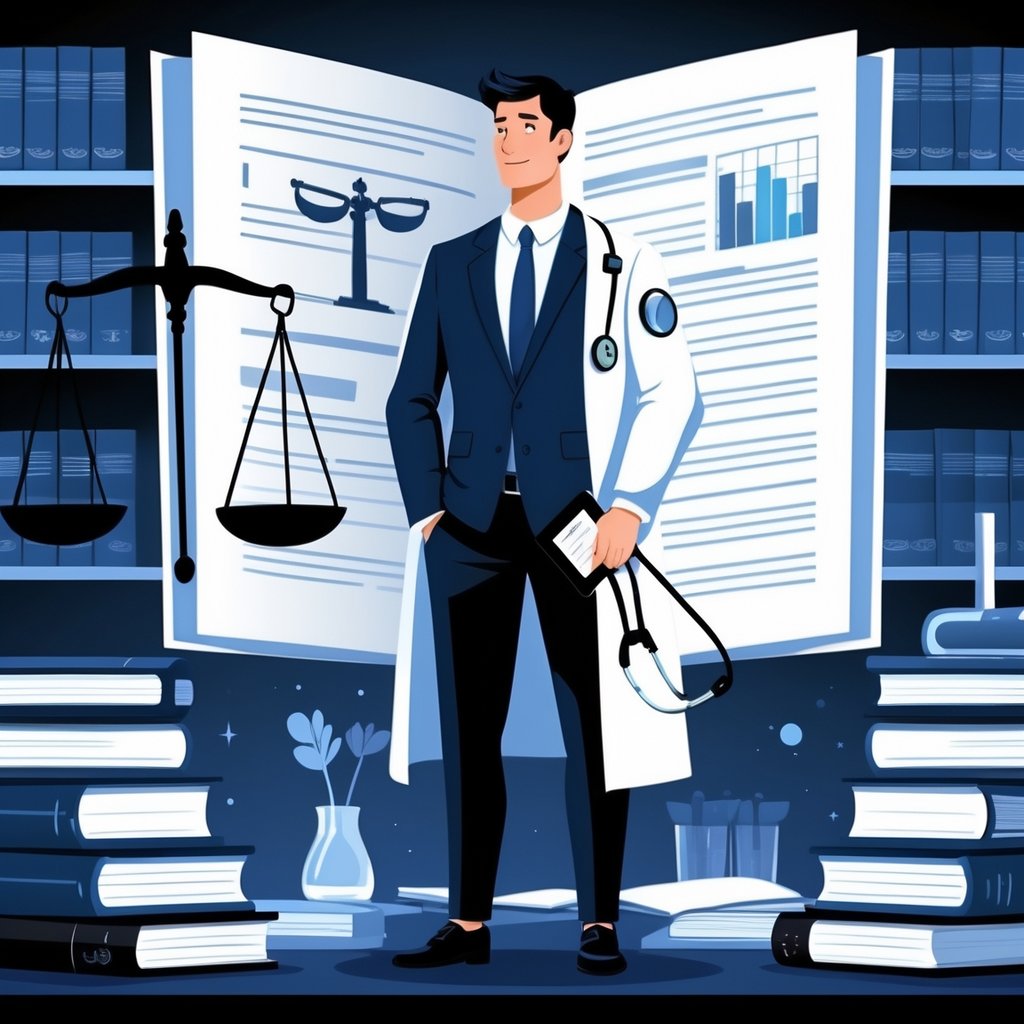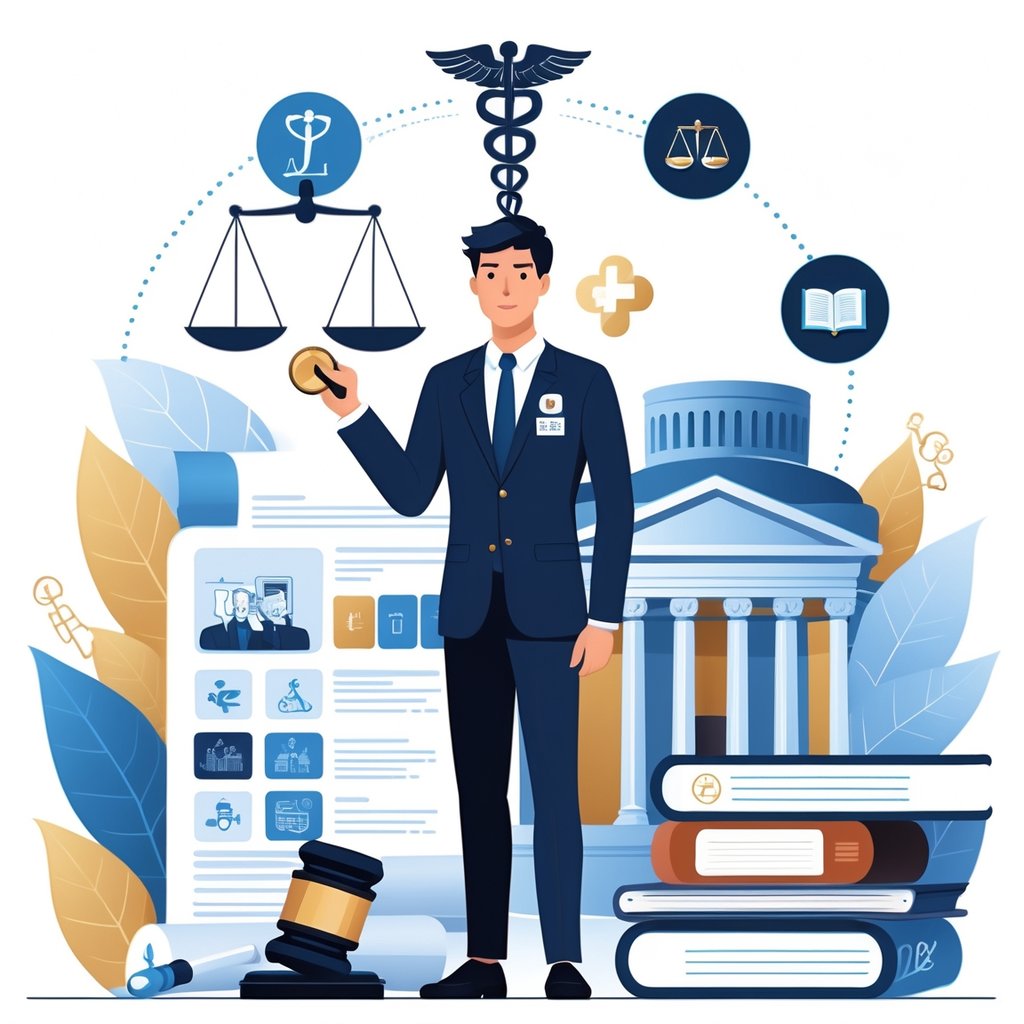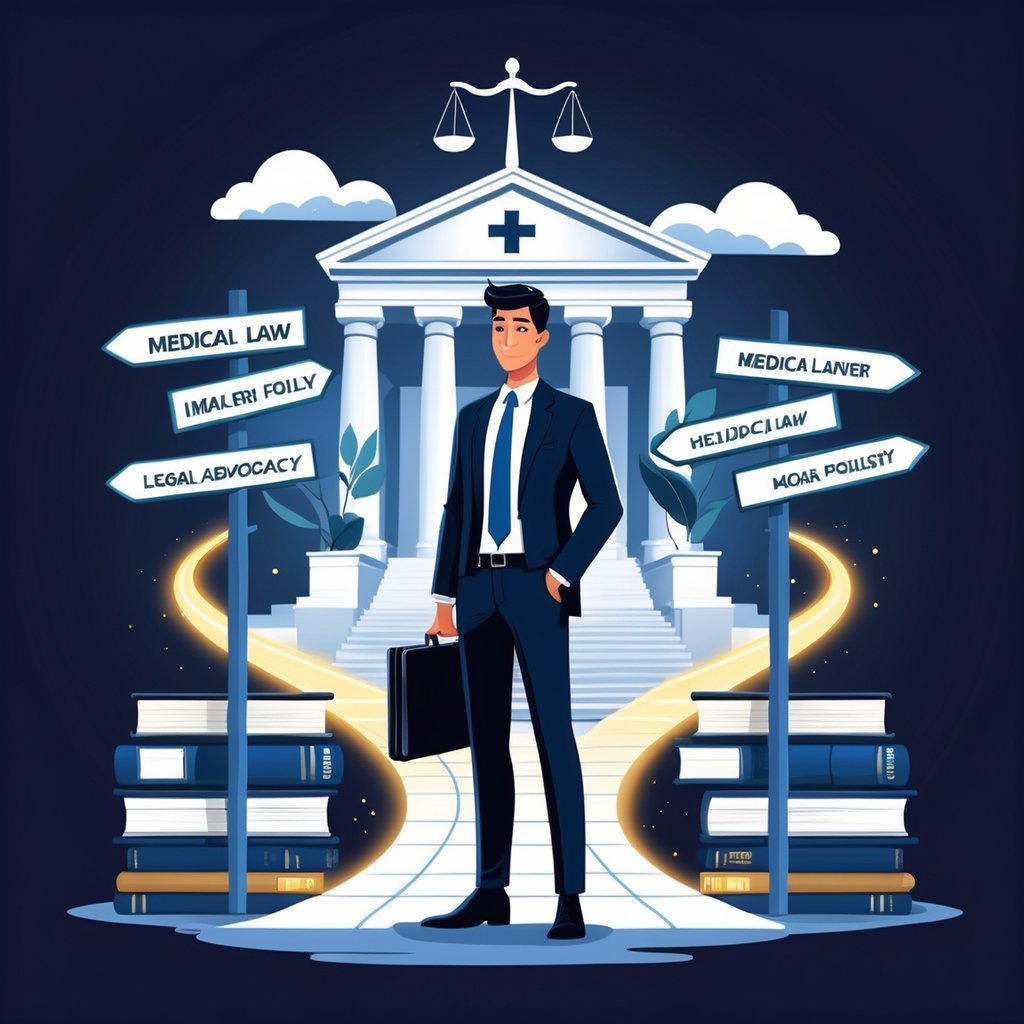Medical lawyers represent patients, healthcare providers, and organizations in legal matters. They handle everything from malpractice suits to regulatory compliance.
This field blends legal expertise with a strong understanding of healthcare systems. It’s challenging, no doubt, but many find it deeply rewarding.

To become a medical lawyer, you’ll need a bachelor’s degree, a law degree, and you have to pass the bar exam. Specialized experience in healthcare law comes from internships or extra training. This process usually takes seven to eight years, and it demands a real commitment to both law and complex medical regulations.
The demand for medical lawyers keeps growing as healthcare gets more regulated and complicated. Lawyer employment is projected to grow 5% from 2023 to 2033.
Key Takeaways
- You’ll need an undergraduate degree, law school, and to pass the bar exam to work in medical law
- The average salary for medical lawyers is $100,626 per year, with experienced lawyers making more
- There are many career paths, including patient advocacy, healthcare compliance, and health policy
Understanding the Role of a Medical Lawyer

Medical lawyers bridge healthcare and law. They provide legal services to providers, patients, and organizations.
They work on issues like malpractice defense, regulatory compliance, and bioethics.
Medical Law and the Healthcare Industry
Medical law shapes the healthcare system with regulations and legal frameworks. Healthcare attorneys help providers, hospitals, and organizations follow both federal and state laws.
Healthcare providers look to medical lawyers for help with:
- HIPAA privacy rules
- Medicare and Medicaid compliance
- Joint Commission standards
- State licensing
Regulations in healthcare change all the time. Medical lawyers help organizations keep up with new laws and still focus on patient care.
Healthcare organizations need lawyers for contract negotiations and mergers. Medical lawyers review agreements between hospitals, insurers, and device manufacturers.
Public health emergencies bring extra legal headaches. Medical lawyers advise on emergency protocols, resource allocation, and liability during crises.
Key Responsibilities in Medical Law Practice
Medical lawyers’ daily work changes based on where they practice and what they specialize in. Healthcare attorneys deal with medical misconduct and malpractice and give legal advice to prevent problems.
Primary responsibilities include:
| Legal Area | Key Tasks |
|---|---|
| Malpractice Defense | Review medical records, consult expert witnesses, negotiate settlements |
| Regulatory Compliance | Monitor healthcare laws, conduct compliance audits, draft policies |
| Contract Law | Negotiate physician employment agreements, review vendor contracts |
| Patient Rights | Handle privacy breaches, advance directive disputes, informed consent issues |
You’ll spend a lot of time reviewing medical records and talking with healthcare professionals. Knowing medical terms and procedures is pretty much a must.
Legal advice isn’t just about going to court. You’ll draft compliance programs, train staff, and develop risk management strategies.
Malpractice cases take serious prep and medical knowledge. You’ll work with expert witnesses to dig into procedures and negligence claims.
Specializations Within Medical Law
Medical law offers several ways to specialize. Each path asks for unique knowledge of healthcare and law.
Medical malpractice is the biggest area. You might defend providers or represent patients in negligence cases.
Bioethics deals with tough ethical issues in medicine. Here, you’ll look at:
- End-of-life decisions
- Genetic testing and privacy
- Clinical trial regulations
- Organ transplant policies
Healthcare regulatory law focuses on following government rules. You’ll help with Medicare fraud investigations, FDA approvals, and state requirements.
Health insurance law covers disputes over claims and coverage between patients, providers, and insurers.
Public health law deals with community health and policy. You might work on vaccination rules, disease reporting, or emergency planning.
No matter your focus, you’ll need to keep learning. Medical practices and legal standards change fast.
Educational Pathway to Becoming a Medical Lawyer

To become a medical lawyer, you’ll need a bachelor’s degree, a competitive LSAT score, and a Juris Doctor from an accredited law school. A background in science or healthcare helps, but isn’t required.
Undergraduate Degree Requirements
You can major in anything as an undergrad. Law schools don’t require a specific major.
That said, science majors like biology or chemistry give you a leg up for healthcare law. They help you understand medical details in tough cases.
Pre-law programs teach critical thinking and writing. These skills are crucial for law school.
Healthcare administration and public health degrees offer insight into how healthcare works. You’ll learn about systems, regulations, and the policy issues medical lawyers see every day.
Take classes in ethics, statistics, and economics. These topics come up a lot in healthcare law.
Keep your GPA high. Top law schools usually want at least a 3.7.
Preparing for the Law School Admission Test (LSAT)
The LSAT is a must for law school. It tests reading, logic, and analytical skills.
Take the LSAT in your junior year. This gives you time to retake it if you want a higher score.
Most people study for 3-6 months. Prep courses or official study guides are helpful.
Scores run from 120 to 180. The best schools usually want at least 165.
You can take the LSAT three times in a year. Schools usually look at your highest score.
Register early to get your preferred test date. Popular dates fill up fast.
Law School and Juris Doctor Degree
A Juris Doctor takes three years at an accredited law school. The American Bar Association approves schools that meet their standards.
Law school rankings matter for jobs and networking. Higher-ranked schools open more doors.
Your first year covers basics like constitutional law, contracts, and torts. These build your legal foundation.
In your second and third years, focus on healthcare law courses. Some schools offer medical law concentrations.
Get hands-on experience through healthcare law clinics or externships. Working on real cases with supervision is invaluable.
Schools near big medical centers often have more internship options and connections.
Take classes in bioethics, health policy, and medical malpractice law. These will prepare you for specialized work.
Law School Specializations and Practical Experience

If you’re interested in medical law, focus on health law classes and get hands-on experience. Academic specialization matters, but real-world practice is just as important.
Choosing a Focus in Health Law or Medical Law
Most law schools have healthcare law programs or concentrations. These include courses in healthcare regulation, bioethics, and patient rights.
Try to take:
- Medical malpractice law
- Healthcare compliance and regulation
- Bioethics
- Health insurance law
- Pharmaceutical and device regulation
Electives might cover healthcare fraud, Medicare and Medicaid law, and mental health law. Specialized courses prepare you for complex cases.
Healthcare law isn’t like general practice. You need to know legal principles and medical lingo. Understanding how hospitals work and how medical decisions are made is part of the job.
Participating in Legal Clinics and Internships
Legal clinics let you work on real cases with supervision. Many schools have health law clinics where you can help patients with insurance appeals or disability claims.
Internships in medical law can be at hospitals, law firms, or government agencies. You’ll see malpractice cases, compliance work, and regulatory issues up close.
Summer internships at healthcare organizations show you how legal issues affect hospitals day-to-day. You might handle contracts, policy, or compliance audits.
Agencies like the Department of Health and Human Services offer internships too. These give you a look at policy development and enforcement.
Clerkships and Research Opportunities
Judicial clerkships with judges who handle medical cases give you courtroom experience. Federal judges often deal with Medicare fraud, FDA rules, and healthcare law.
You can also do research with professors who focus on health law. Publishing legal work shows dedication and builds expertise.
You might help research:
- Telemedicine regulation
- Data privacy in healthcare
- Medical device liability
- Hospital merger compliance
Research skills matter here. Regulations change constantly, so you need to keep up with FDA approvals, CMS rules, and new court decisions.
Writing for law journals or healthcare publications can help you stand out. Employers like seeing published work.
Networking and Professional Organizations
The American Health Lawyers Association (AHLA) offers student memberships. You’ll get access to programs, networking, and job leads. AHLA also puts out journals and runs conferences about healthcare legal issues.
Many law schools have health law student groups. These host speakers, networking, and career panels.
Conferences let you meet employers and learn about new healthcare law developments. Topics range from malpractice trends to regulatory shifts.
Volunteer groups focused on healthcare access often need legal help. Pro bono work builds experience and shows you care.
Networking in this field should include both lawyers and healthcare professionals. Building relationships with doctors, nurses, and administrators helps you understand their legal challenges.
Licensing and Certification Requirements

Medical lawyers have to pass the state bar exam, get a law license, and keep up with continuing education to maintain their legal credentials and stay up to date on healthcare law.
Bar Exam Preparation and Passage
You need to pass your state’s bar exam to practice law as a medical lawyer. This exam checks your understanding of legal principles and procedures.
Preparation usually means:
- 6 to 8 weeks of full-time study
- Commercial bar review courses
- Practice exams and mock tests
- Reviewing state-specific laws
The bar exam includes multiple-choice questions and written essays. Some states use the Uniform Bar Examination, while others create their own format.
Focus extra time on healthcare-related legal topics. Medical malpractice law, patient privacy rules, and healthcare compliance issues are especially important.
Most students take the bar right after graduating law school. Pass rates differ from state to state, usually between 60 and 80 percent.
Obtaining a Law License
Getting a law license matters if you want to practice medical law on your own. Each state sets its own licensing rules and procedures.
Typical requirements:
- Pass the bar exam
- Character and fitness review
- Law degree from an accredited school
- Application fees and documents
The character and fitness review looks into your background. They’ll check for criminal history or academic issues.
You have to provide lots of details about your education, jobs, and personal history. Some states add extra steps like the Multistate Professional Responsibility Examination (MPRE).
This exam covers legal ethics and professional conduct. You’ll need to renew your license regularly, usually every 1 to 3 years depending on your state.
Continuing Legal Education
You have to complete continuing legal education (CLE) courses to keep your law license active. These requirements help you stay up to date on legal changes and healthcare rules.
CLE usually involves:
- 12 to 24 hours each year
- Ethics training
- Subject-specific courses
- Attendance at approved programs
The American Bar Association and state bar associations offer plenty of CLE options. It’s smart to focus on healthcare law topics like HIPAA, medical device rules, and telehealth issues.
Many states let you count online courses or self-study programs toward your CLE hours. Live seminars and conferences also work.
Some medical law specialties ask for extra certifications from professional groups. These show you’ve got expertise in certain healthcare legal areas.
Key Legal Concepts and Skills for Medical Lawyers

Medical lawyers have to master complicated healthcare regulations. They also need to understand malpractice standards and build strong analytical and communication skills.
You’ll need expertise in HIPAA, negligence law, and some specialized skills to represent your clients well.
Healthcare Regulations and Compliance
You’ll spend a lot of time working with federal and state healthcare rules. The Affordable Care Act, Medicare and Medicaid policies, and FDA drug approval processes shape much of this work.
Key areas include:
- Hospital licensing and accreditation
- Medical device regulations and safety
- Laws on pharmaceutical marketing and distribution
- Preventing healthcare fraud and abuse
You’ll help healthcare providers figure out these complicated rules. Understanding how regulations impact daily medical practice and business operations is crucial.
Healthcare compliance means you interpret government guidelines and turn them into real policies. You’ll draft compliance programs and run risk assessments for medical facilities.
Medical Malpractice and Negligence
Medical malpractice cases ask if healthcare providers met the accepted standard of care. You need to know how medical negligence is different from honest mistakes or bad outcomes.
Core malpractice concepts:
- Duty of care between doctor and patient
- Breach of professional standards
- Causation connecting negligence to harm
- Calculating damages and compensation
You’ll review medical records and work with expert witnesses to decide what counts as proper care. Understanding informed consent is key since patients need enough information about treatment risks.
Your analytical skills help you spot when medical errors become legal negligence. You’ll have to tell the difference between sound medical judgment and substandard care that hurts patients.
Regulatory Compliance and HIPAA
HIPAA privacy and security rules control how providers handle patient info. You need to know both the Privacy Rule, which protects patient data, and the Security Rule, which covers electronic health records.
HIPAA compliance areas:
- Patient consent for sharing information
- Breach notification rules
- Business associate agreements
- Penalties for privacy violations
You’ll help healthcare organizations create policies that protect patient privacy and allow for necessary communication. Knowing when you can share info without patient consent really matters.
You’ll also have to deal with state privacy laws that might give patients more protection. Sometimes you’ll have to balance federal HIPAA rules with stricter state laws.
Essential Analytical, Communication, and Negotiation Skills
Your analytical skills let you dig into complex medical records and spot legal issues. You have to pick up medical terms fast and understand clinical decisions.
Critical skills to develop:
| Skill Type | Application |
|---|---|
| Critical thinking | Evaluating medical evidence and legal precedents |
| Writing skills | Drafting legal briefs and compliance documents |
| Communication skills | Explaining legal concepts to healthcare clients |
| Negotiation skills | Settling malpractice claims and insurance disputes |
You’ll need to explain legal requirements in plain language for busy healthcare professionals. Communication makes a big difference when your clients aren’t familiar with legal jargon.
Negotiation skills come into play with insurance disputes or malpractice settlements. You’ll need to understand both the medical and financial sides to get good results for your clients.
Career Opportunities and Advancement in Medical Law

Medical lawyers can work all over the healthcare industry, from private practice to government agencies. Salaries are strong, and specialized expertise can bring premium compensation.
Employment Settings for Medical Lawyers
You have a lot of options as a medical lawyer. Private law firms focused on healthcare are the most common starting point for new grads.
Healthcare organizations hire in-house counsel for regulatory compliance and patient disputes. You’ll work directly with healthcare providers on legal matters.
Government agencies like the Department of Health employ medical lawyers for policy work. These jobs focus on regulations and enforcement.
Insurance companies need lawyers to review malpractice claims. You’ll look over medical records and help with coverage decisions.
Non-profit groups that advocate for patients also hire medical lawyers. Here, you’ll work on protecting patient rights and improving access to care.
Academic institutions with medical schools bring on legal counsel for research compliance. You’ll handle clinical trial and medical education issues.
Job Market and Salary Outlook
The job market for medical lawyers keeps growing as healthcare regulations get more complex. Your salary depends a lot on where you work and your area of expertise.
Entry-level jobs usually pay between $70,000 and $90,000 per year. Government and non-profits tend to pay less than private firms.
Experienced medical lawyers in private practice can make $150,000 to $300,000 a year. Those at big healthcare organizations or pharma companies sometimes earn even more.
Location makes a big difference. Big cities with major healthcare systems pay higher, but there’s more competition too.
The Bureau of Labor Statistics expects steady demand for lawyers with healthcare knowledge. The aging population and complicated healthcare system keep the need high.
Law firm partnerships offer the highest pay. Senior partners in medical malpractice or healthcare mergers can pull in over $500,000 a year.
Specializing Further Within Medical Law
Advancing your career usually means focusing on a specific area within medical law. Deeper expertise can lead to higher fees and better jobs.
Medical malpractice defense is one of the most lucrative specialties. You’ll defend providers against negligence claims and work with medical experts.
Healthcare regulatory compliance is another path, helping organizations handle complicated rules. You’ll need a deep understanding of healthcare policy.
Bioethics and research law covers clinical trials and research regulations. You’ll work with pharmaceutical companies and universities.
Healthcare mergers and acquisitions blend corporate law with healthcare rules. Big organizations need this skill set often.
Patient privacy and data security are growing fields thanks to electronic health records. HIPAA compliance and data breach response are big practice areas.
Medical device and pharmaceutical law focuses on FDA rules and product liability. You’ll help manufacturers with regulatory approval and defend them in court.
Frequently Asked Questions

Medical law demands specific education, licensing, and a blend of legal and healthcare knowledge. Most aspiring medical lawyers put in seven to eight years of education and must pass state bar exams.
What educational path is required to pursue a career in medical law?
You’ll need a four-year bachelor’s degree before law school. Law schools don’t require a specific major, so you can study whatever interests you.
Many future medical lawyers pick majors in healthcare or science. Public health, biology, or chemistry can give you a head start.
After your bachelor’s, you’ll go through a three-year law school program. During law school, you can take courses in medical malpractice and public health law.
Some schools offer concentrations in health law or biomedical law. These help you focus on medical legal issues.
Some medical lawyers earn a Master of Laws (LL.M.) in health care or global health law. This advanced degree can give you an edge.
Are there any mandatory certifications or licensure examinations for becoming a medical lawyer?
You have to pass your state’s bar exam to practice law. The bar exam is tough, so you’ll need plenty of prep time.
Most lawyers study full-time for six to eight weeks before the bar. You have to pass before you can represent clients.
Every state has its own bar exam requirements. You need to pass in the state where you plan to practice.
There’s no special medical law certification beyond the regular bar. Still, some employers like to see extra health law credentials.
What specializations are available within the field of medical law, and how does one choose a suitable area of expertise?
Medical lawyers handle cases in malpractice, healthcare regulations, and patient rights. You can represent patients, providers, or institutions.
Medical malpractice is a popular choice. These lawyers help patients hurt by medical negligence.
Healthcare compliance is another area. You’d help hospitals and practices follow laws and regulations.
Health insurance law deals with disputes between patients and insurers. You might work on coverage denials or billing problems.
Bioethics and research law focus on clinical trials and patient consent. This area mixes medical knowledge with legal work.
What is the typical career trajectory for a lawyer interested in specializing in medical related legal matters?
Most medical lawyers start as general associates at law firms after passing the bar. You usually need five to ten years of experience for top jobs.
Entry-level jobs might be at personal injury firms handling malpractice cases. You could also work as in-house counsel at healthcare organizations.
Mid-level lawyers often become senior associates or junior partners at specialized firms. Some move to government healthcare roles.
Experienced medical lawyers may become partners or general counsel for big healthcare systems. Some open their own practices in niche areas.
Building expertise in a medical specialty helps your career. Building relationships with medical professionals can open doors.
How important is gaining experience in healthcare settings for a career in medical law, and what are the best ways to obtain such experience?
Healthcare experience gives you a real sense of how things work in clinics and hospitals. You start picking up medical terms and seeing how procedures actually unfold.
This kind of background makes it easier to wrap your head around complicated malpractice cases. Suddenly, all that jargon and paperwork starts to make sense.
During law school, try landing internships at hospitals or with healthcare organizations. Some law schools even have clinical programs focused on health law, which can be a huge plus.
Working as a paralegal at a medical malpractice firm gets you right in the thick of things. You see how cases are built and which pieces of evidence really matter.
Some folks head into law after spending time in healthcare jobs like nursing or administration. That kind of experience is hard to fake and really stands out.
Volunteering at free clinics or with health advocacy groups can open your eyes to patient rights and the real barriers people face. You get a front row seat to the challenges around healthcare access.
Can you list the professional organizations that a prospective medical lawyer should consider joining for networking and career advancement?
The American Health Lawyers Association, or AHLA, stands out as the main group for medical lawyers. It gives you access to continuing education and plenty of networking events.
The American Bar Association has a Health Law Section that dives into medical legal topics. You’ll find useful resources and training programs there.
State bar associations usually feature health law committees or sections. These local groups are great for connecting with others in your area.
The National Association of Healthcare Access Management centers on patient access and financial concerns. Lawyers can learn a lot about healthcare operations through this group.
The Healthcare Compliance Association focuses on regulatory compliance education. Membership keeps you in the loop with healthcare law changes.
Professional liability organizations like the American College of Legal Medicine bring together legal and medical expertise. They also offer specialized training and sometimes certification programs.












